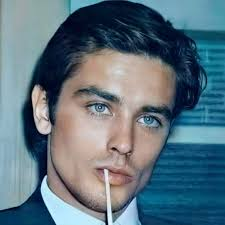Alain Delon
Alain Delon, born on November 8, 1935, in Sceaux, France, is an actor whose name has become synonymous with French cinema. Over the course of his illustrious career, Delon has captivated audiences with his striking looks, magnetic screen presence, and versatility. He is not just a celebrated actor but a cultural icon whose influence extends far beyond the world of film.
Table of Contents
#Early Life: A Troubled Youth
Delon’s early life was far from easy. Born to a single mother and later adopted by her new husband, Delon had a tumultuous childhood marked by frequent changes in residence and a lack of stability. This instability may have contributed to his rebellious nature as a teenager, leading to his expulsion from several schools. At 17, Delon enlisted in the French Navy, hoping to find direction and discipline. However, after a stint in the military, including a deployment to Indochina, Delon found himself back in Paris, struggling to find his way.

#The Accidental Star: Breakthrough in Cinema
Delon’s entry into the world of cinema was almost accidental. Working odd jobs in Paris, he was spotted by a talent scout who recognized his potential. Despite his lack of formal training, Delon’s raw charisma and good looks landed him a role in the 1957 film “Quand la femme s’en mêle” (When a Woman Meddles). This was the beginning of a meteoric rise that would soon see Delon become one of the most sought-after actors in Europe.

#Rising to Stardom: The 1960s and Beyond
The 1960s were a defining decade for Delon. His role in “Plein Soleil” (Purple Noon) in 1960, an adaptation of Patricia Highsmith’s novel The Talented Mr. Ripley, showcased his talent and marked the beginning of his international fame. Delon’s portrayal of the charming yet sinister Tom Ripley won him critical acclaim and established him as a leading man in European cinema.
Delon’s collaboration with director Luchino Visconti in Rocco and His Brothers (1960) and The Leopard (1963) further cemented his status as an acting powerhouse. These films not only highlighted his range as an actor but also introduced him to a wider international audience. Delon’s cold, enigmatic persona became his trademark, a quality that was perfectly suited for the film noir genre. His role in Jean-Pierre Melville’s Le Samouraï (1967) as the stoic, solitary hitman Jef Costello remains one of his most iconic performances.

#A Global Sensation: Hollywood and Beyond
Although Delon was primarily a European star, his appeal did not go unnoticed in Hollywood. He appeared in several American films, including The Yellow Rolls-Royce (1964) and Texas Across the River (1966). However, Delon was selective about his roles in Hollywood, preferring to work on European projects where he felt he had more creative control.
Delon’s success in the 1960s and 1970s was not limited to acting. He became a symbol of masculinity and style, often compared to American stars like James Dean and Marlon Brando. His looks and persona made him a favorite among fashion designers, and he became a trendsetter in men’s fashion, particularly with his iconic trench coat and fedora look in Le Samouraï.
#Personal Life: A Man of Mystery
Much like his on-screen characters, Delon’s personal life has been shrouded in mystery and intrigue. His relationships with some of the most beautiful women of his time, including Romy Schneider, Mireille Darc, and Nathalie Delon, were widely publicized. However, Delon has always been a private person, fiercely protective of his personal life. His relationship with Romy Schneider, in particular, captivated the public, and their break-up in 1963 was highly publicized.
Despite his fame, Delon has often been described as a solitary figure, someone who values his privacy above all else. He has also been involved in several controversies, including allegations of ties to organized crime and far-right political views. However, Delon has always denied these claims, insisting that he is misunderstood.
#Later Career: Transition to Producer and Beyond
As the years went on, Delon transitioned from acting to producing, establishing his own production company, Adel Productions, in the 1970s. This move allowed him to take greater control over his projects and continue working on films that aligned with his artistic vision. Delon’s later career included notable films such as Borsalino (1970), a gangster film that he produced and starred in alongside Jean-Paul Belmondo, and Le Cercle Rouge (1970), another collaboration with Jean-Pierre Melville.
Delon’s career slowed down in the 1980s and 1990s, but he continued to act sporadically, with his last film appearance being in Asterix at the Olympic Games (2008), where he played Julius Caesar. In 2019, Delon was awarded an honorary Palme d’Or at the Cannes Film Festival, a recognition of his immense contribution to cinema.
#Legacy: The Enduring Influence of Alain Delon
Alain Delon’s impact on cinema and popular culture is undeniable. He remains one of the most recognizable figures in French cinema, and his films continue to be celebrated for their artistry and Delon’s performances. His influence can be seen in the works of contemporary filmmakers and actors who admire his ability to convey complex emotions with a mere glance or gesture.
In addition to his contributions to film, Delon’s style and persona have left a lasting imprint on fashion and culture. He embodied a unique blend of sophistication, danger, and allure that continues to inspire generations of men.
indianfastearning.comhttp://indianfastearning.com
#Conclusion: An Iconic Career
Alain Delon’s career is a testament to his talent, resilience, and enduring appeal. From his troubled youth to becoming one of the most iconic actors in the world, Delon’s journey is one of remarkable transformation. Though he has faced personal and professional challenges, Delon’s legacy as a cinematic icon is secure. His films will continue to be watched and admired, ensuring that Alain Delon remains a timeless symbol of French cinema.
www.utube.comhttp://www.utube.com







